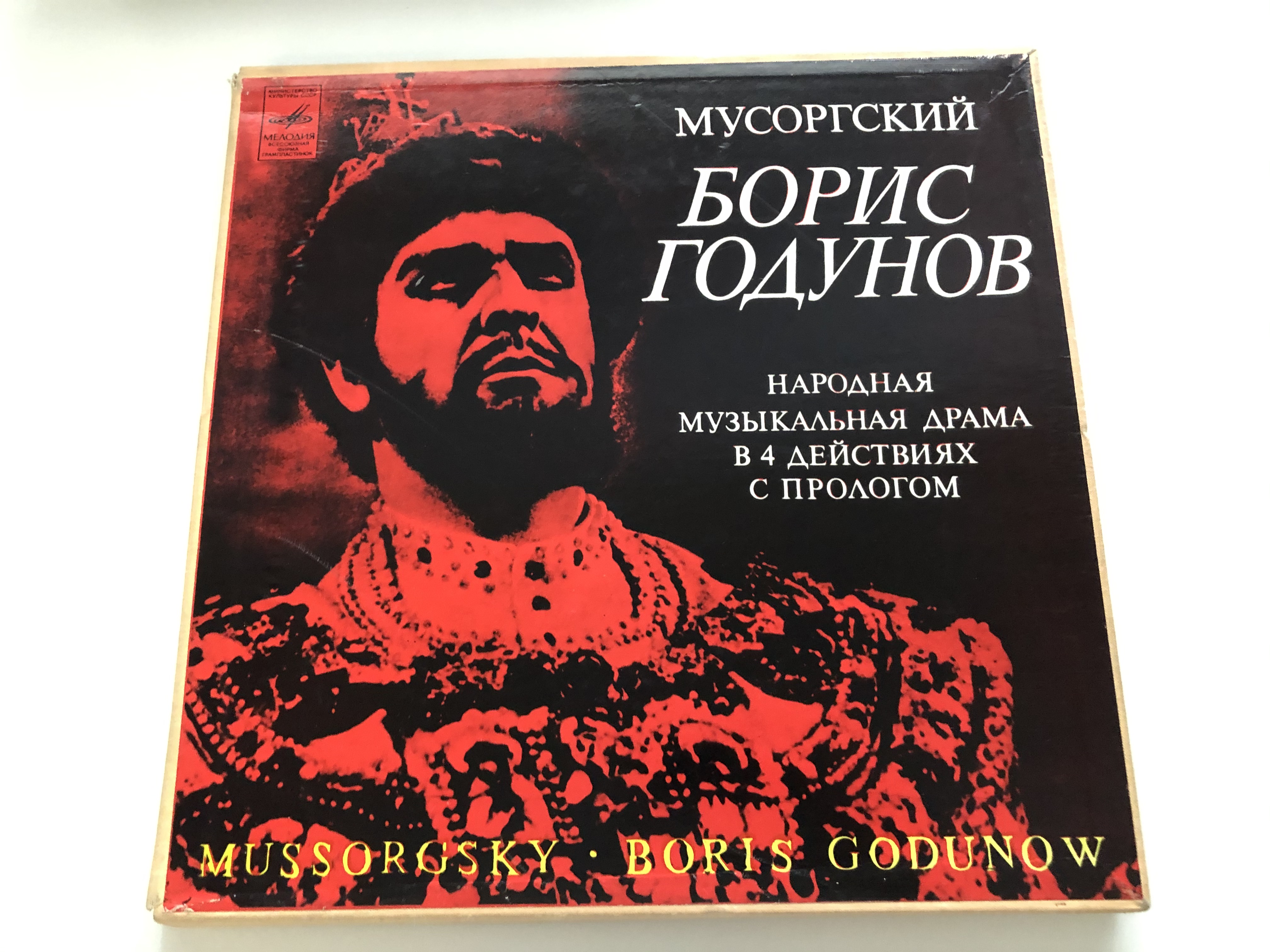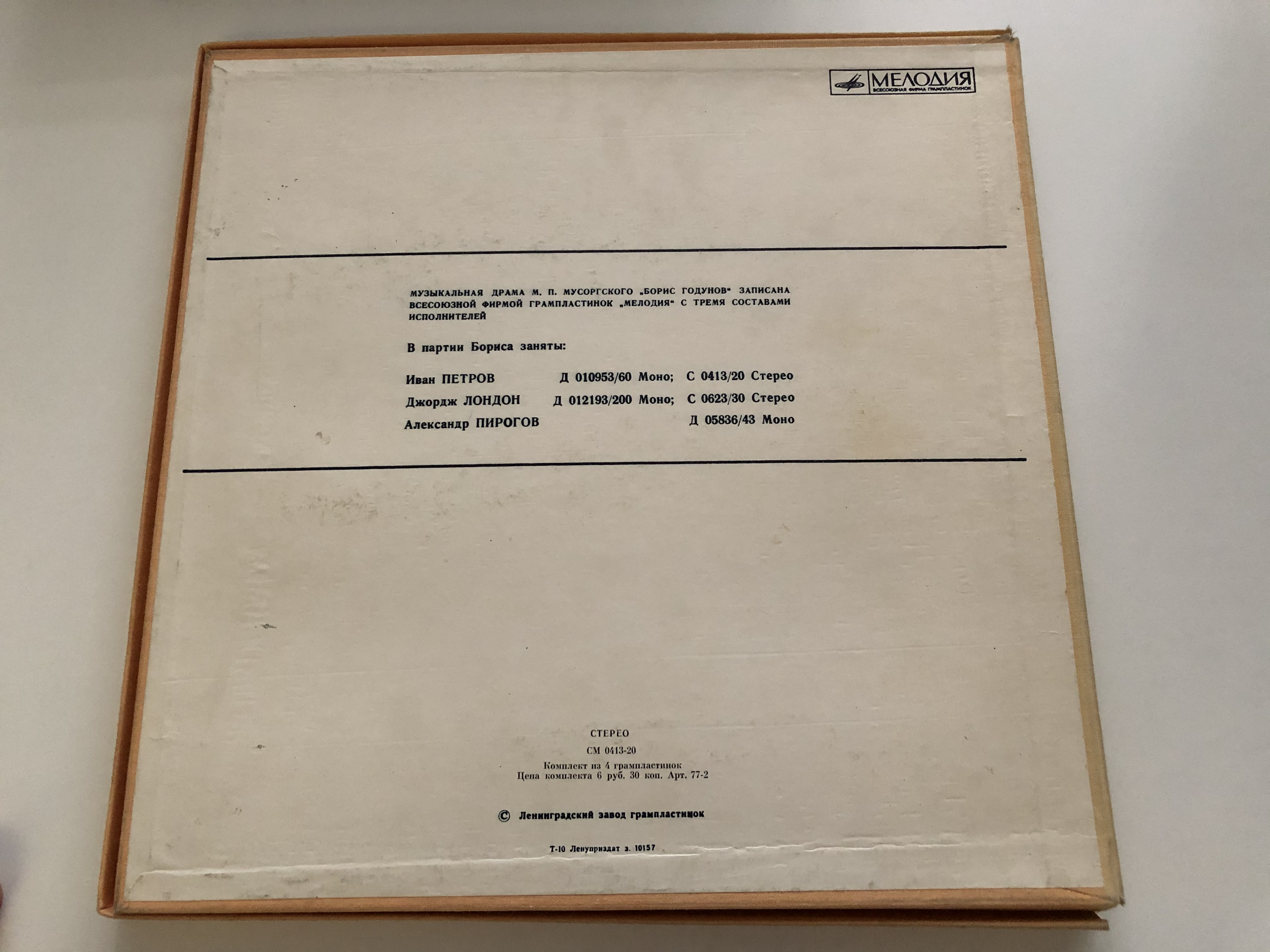Description
Musorgsky, Boris Godunov - Folk Musical Drama In 4 Acts, With Prologue / Мелодия 4x LP Stereo
СМ—0413 - 20
Boris Godunov is an opera by Modest Mussorgsky (1839–1881). The work was composed between 1868 and 1873 in Saint Petersburg, Russia. It is Mussorgsky's only completed opera and is considered his masterpiece. Its subjects are the Russian ruler Boris Godunov, who reigned as Tsar (1598 to 1605) during the Time of Troubles, and his nemesis, the False Dmitriy (reigned 1605 to 1606). The Russian-language libretto was written by the composer, and is based on the 1825 drama Boris Godunov by Aleksandr Pushkin, and, in the Revised Version of 1872, on Nikolay Karamzin's History of the Russian State.
Among major operas, Boris Godunov shares with Giuseppe Verdi's Don Carlos (1867) the distinction of having an extremely complex creative history, as well as a great wealth of alternative material. The composer created two versions—the Original Version of 1869, which was rejected for production by the Imperial Theatres, and the Revised Version of 1872, which received its first performance in 1874 in Saint Petersburg.
Boris Godunov has seldom been performed in either of the two forms left by the composer, frequently being subjected to cuts, recomposition, re-orchestration, transposition of scenes, or conflation of the original and revised versions.
Several composers, chief among them Nikolay Rimsky-Korsakov and Dmitri Shostakovich, have created new editions of the opera to "correct" perceived technical weaknesses in the composer's original scores. Although these versions held the stage for decades, Mussorgsky's individual harmonic style and orchestration are now valued for their originality, and revisions by other hands have fallen out of fashion.
In the 1980s, Boris Godunov was closer to the status of a repertory piece than any other Russian opera, even Tchaikovsky's Eugene Onegin, and is the most recorded Russian opera.
Tracklist:
| Boris Godunov - Folk Musical Drama In 4 Acts, With Prologue (Version By N. Rimsky-Korsakov) | |||
| Prologue | |||
| A1 | Scene I - The Yard Of Novo-Devichy Monastery Near Moscow | ||
| A2 | Scene 2 - Square In The Moscow Kremlin | ||
|
Act I |
|||
| B1 | Scene 1 - Night. Cell In The Chudov Monastery | ||
| C1 |
Scene 2 - An Inn On The Lithuanian Border | ||
|
Acte II |
|||
| The Royal Chamber In The Moscow Kremlin | |||
| D1 | Acte II (End) | ||
|
Act III |
|||
| E1 | Scene 1 - Marina Mniszek's Chamber In Sandomir | ||
|
Scene 2 - Mniszek's Castle In Sandomir Garden, Fountain |
|||
| F1 | Act III - Scene 2 (End) | ||
|
Act IV |
|||
| Scene 1 - Scene At St. Basil's Cathedral | |||
| G1 | Scene 2 - Granovitaya Chamber In The Moscow Kremlin | ||
| H1 | Scene 3 - Clearing In The Forest Near Kromy |
- Baritone Vocals [Rangoni] – Evguéni Kibbalo
- Baritone Vocals [Stshelkalov] – Alexis Ivanov
- Bass Vocals [Boris Goudonov] – Ivan Pétrov
- Bass Vocals [Pimen] – Marc Réchétine
- Bass Vocals [Police Officer] – Léonide Ktitorov
- Bass Vocals [Varlaam] – Alexis Guéléva
- Chorus – Chorus Of The Bolshoi Theatre
- Chorus Master – A. Rybnov
- Composed By – M. Moussorgsky
- Conductor – Alexandre Mélik-Pachaev
- Mezzo-soprano Vocals [Fodor] – Valentina Klépatzkaïa
- Mezzo-soprano Vocals [Landlady] – Veronika Borissenko
- Mezzo-soprano Vocals [Nurse] – Evguénia Verbitskaïa
- Orchestra – Orchestra Of The Bolshoi Theatre
- Soprano Vocals [Marina] – Irina Arkhipova
- Soprano Vocals [Xenia] – Tamara Sorokina
- Tenor Vocals [Boyare] – Anatoly Mishutin
- Tenor Vocals [Dimitry] – Vladimir Ivanovski
- Tenor Vocals [Idiot] – Anton Grigoriev
- Tenor Vocals [Missaïl] – Nikolaï Zakharov
- Tenor Vocals [Shuishky] – Guéorgui Choulpine
- Vocals [First Woman] – Antonia Ivanova
- Vocals [Mitiukha] – Victor Gorbunov
- Vocals [Second Woman, Boyares, Jesuits] – Valentina Petrova


























